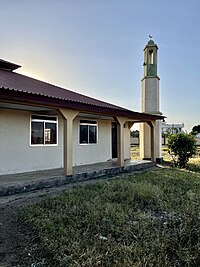| Mbweni Kata ya Mbweni (Swahili) | |
|---|---|
| Ward of Kinondoni District | |
  From top to bottom:
From top to bottom:Suburban homes in Mbweni & Masjid Manaabir Ikhaii in Mbweni | |
| Coordinates: 6°34′39.36″S 39°7′28.56″E / 6.5776000°S 39.1246000°E / -6.5776000; 39.1246000 | |
| Country | |
| Region | Dar es Salaam Region |
| District | Kinondoni District |
| Area | |
| • Total | 7.5 km (2.9 sq mi) |
| Population | |
| • Total | 13,766 |
| Ethnic groups | |
| • Settler | Swahili |
| • Ancestral | Zaramo |
| Tanzanian Postal Code | 14126 |
Mbweni (Kata ya Mbweni, in Swahili) is an administrative ward in Kinondoni District of the Dar es Salaam Region in Tanzania. The Indian Ocean and the Kerege ward of Bagamoyo District of Pwani Region encircle the ward's northern boundary. Kunduchi and Bunju wards form the ward's southern and western boundaries. The ward of Mbweni was once home to a Medieval Swahili settlement. According to the 2012 census, the ward has a population of 13,766.
Administration
The postal code for Mbweni ward is 14126. The ward is divided into the following neighborhoods (Mitaa):
|
|
Government
The ward, like every other ward in the country, has local government offices based on the population served. The Mbweni Ward administration building houses a court as per the Ward Tribunal Act of 1988, including other vital departments for the administration the ward. The ward has the following administration offices:
- Mbweni Ward Police Station
- Mbweni Ward Government Office (Afisa Mtendaji)
- Mbweni Ward Tribunal (Baraza La Kata) is a Department inside Ward Government Office
In the local government system of Tanzania, the ward is the smallest democratic unit. Each ward is composed of a committee of eight elected council members which include a chairperson, one salaried officer (with no voting rights), and an executive officer. One-third of seats are reserved for women councillors.
Demographics
The Zaramo people lived in the ward and a major portion of the district at one time. As the city progressed, the ward transformed into an international neighborhood. There are 13,766 people living in the ward.
Education and health
Education
The ward is home to these educational institutions:
- Mbweni Primary School
- Mbweni Teta Secondary School
- Dar es Salaam Independent School, Mbweni
- Hope and Joy Secondary School, Mbweni
- Maendeleo Primary School
- Mount Everest School, Mbweni
- Shamsiye Boys Secondary School, Mbweni
- Nyaishozi College of Health and Allied Sciences, Mbweni
Healthcare
The ward is home to the following health institutions:
- Mbweni Mpiji Dispensary
- Mbweni Health Center
- Mbweni JKT Health Center
- Mbweni "B" Health Center
- St. Joseph's Hospital, Mbweni
- NEHOTA Mental Health Hospital, Mbweni
See also
References
- de Vere Allen, James (1981). "Swahili Culture and the Nature of East Coast Settlement". The International Journal of African Historical Studies. 14 (2): 306–334. doi:10.2307/218047. JSTOR 218047.
- "Census 2012" (PDF). Retrieved 17 October 2021.
- "Mbweni Postal Code". Retrieved 2023-06-21.
- "Ward Tribunal Act 1988". Retrieved 19 March 2023.
- "Local Government System" (PDF). Retrieved 19 March 2023.
- "Kinondoni District Profile 2018" (PDF). The Kinondoni Municipal Council. Retrieved 2023-05-16.
- "Kinondoni District Profile 2018" (PDF). The Kinondoni Municipal Council. Retrieved 2023-05-16.
- "Health Institutions". Retrieved 2023-05-16.
| Kinondoni District | |
|---|---|
| Headquarters: Ndugumbi | |
| Wards | |
| Native Peoples | |
| National Historic Sites | |
| Rivers and Lakes |
|
| National Parks and Forest Reserves |
|
| Islands | |
| Dar es Salaam | |
|---|---|
| Categories | |
| Districts | |
| History | |
| Education | |
| Transport | |
| Landmarks | |
| National Parks | |
This Dar es Salaam Region location article is a stub. You can help Misplaced Pages by expanding it. |